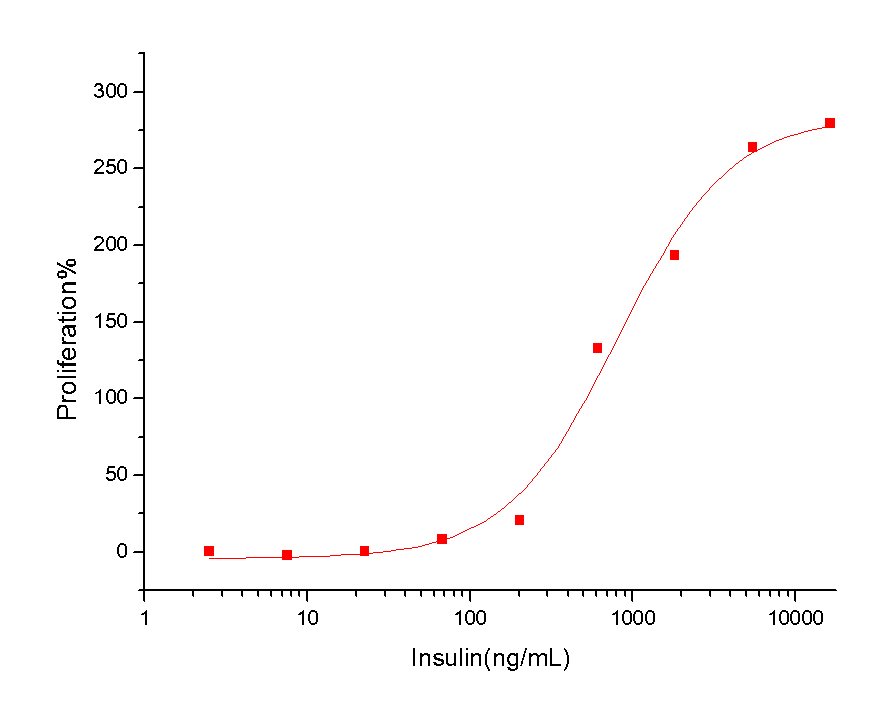- Remove All
 Your shopping cart is currently empty
Your shopping cart is currently empty
Insulin Protein, Human, Recombinant
INS (Insulin) is a Protein Coding gene. This gene encodes insulin, a peptide hormone that plays a vital role in the regulation of carbohydrate and lipid metabolism. After removal of the precursor signal peptide, proinsulin is post-translationally cleaved into three peptides: the B chain and A chain peptides, which are covalently linked via two disulfide bonds to form insulin, and C-peptide. The binding of insulin to the insulin receptor (INSR) stimulates glucose uptake. Diseases associated with INS include Hyperproinsulinemia and Maturity-Onset Diabetes Of The Young, Type 10. A multitude of mutant alleles with phenotypic effects has been identified, including insulin-dependent diabetes mellitus, permanent neonatal diabetes mellitus, maturity-onset diabetes of the young type 10, and hyperproinsulinemia.Cancer ImmunotherapyImmune CheckpointImmunotherapyTargeted Therapy

Insulin Protein, Human, Recombinant
| Pack Size | Price | Availability | Quantity |
|---|---|---|---|
| 100 μg | $386 | In Stock | |
| 200 μg | $660 | 7-10 days | |
| 500 μg | $1,340 | 7-10 days |
Product Information
| Biological Activity | Measured in a serum-free cell proliferation assay using MCF‑7 human breast cancer cells. The ED50 for this effect is typically 0.2-1 µg/mL.  |
| Description | INS (Insulin) is a Protein Coding gene. This gene encodes insulin, a peptide hormone that plays a vital role in the regulation of carbohydrate and lipid metabolism. After removal of the precursor signal peptide, proinsulin is post-translationally cleaved into three peptides: the B chain and A chain peptides, which are covalently linked via two disulfide bonds to form insulin, and C-peptide. The binding of insulin to the insulin receptor (INSR) stimulates glucose uptake. Diseases associated with INS include Hyperproinsulinemia and Maturity-Onset Diabetes Of The Young, Type 10. A multitude of mutant alleles with phenotypic effects has been identified, including insulin-dependent diabetes mellitus, permanent neonatal diabetes mellitus, maturity-onset diabetes of the young type 10, and hyperproinsulinemia.Cancer ImmunotherapyImmune CheckpointImmunotherapyTargeted Therapy |
| Species | Human |
| Expression System | P. pastoris (Yeast) |
| Tag | Tag Free |
| Accession Number | P01308 |
| Synonyms | MODY10,IRDN,insulin,INS,ILPR,IDDM2,IDDM1,IDDM |
| Construction | A DNA sequence encoding human insulin B chain (P01308)(Phe25-Lys53) and human insulin A chain (P01308)(Gly90-Asn110) was expressed with a linker AAK. Predicted N terminal: Phe |
| Protein Purity | > 95 % as determined by SDS-PAGE  |
| Molecular Weight | 7.1 kDa (predicted); 6 kDa (reducing conditions) |
| Endotoxin | Please contact us for more information. |
| Formulation | Lyophilized from a solution filtered through a 0.22 μm filter, containing PBS, pH 7.4. Typically, a mixture containing 5% to 8% trehalose, mannitol, and 0.01% Tween 80 is incorporated as a protective agent before lyophilization. |
| Reconstitution | A Certificate of Analysis (CoA) containing reconstitution instructions is included with the products. Please refer to the CoA for detailed information. |
| Stability & Storage | It is recommended to store recombinant proteins at -20°C to -80°C for future use. Lyophilized powders can be stably stored for over 12 months, while liquid products can be stored for 6-12 months at -80°C. For reconstituted protein solutions, the solution can be stored at -20°C to -80°C for at least 3 months. Please avoid multiple freeze-thaw cycles and store products in aliquots. |
| Shipping | In general, Lyophilized powders are shipping with blue ice. |
| Research Background | INS (Insulin) is a Protein Coding gene. This gene encodes insulin, a peptide hormone that plays a vital role in the regulation of carbohydrate and lipid metabolism. After removal of the precursor signal peptide, proinsulin is post-translationally cleaved into three peptides: the B chain and A chain peptides, which are covalently linked via two disulfide bonds to form insulin, and C-peptide. The binding of insulin to the insulin receptor (INSR) stimulates glucose uptake. Diseases associated with INS include Hyperproinsulinemia and Maturity-Onset Diabetes Of The Young, Type 10. A multitude of mutant alleles with phenotypic effects has been identified, including insulin-dependent diabetes mellitus, permanent neonatal diabetes mellitus, maturity-onset diabetes of the young type 10, and hyperproinsulinemia.Cancer ImmunotherapyImmune CheckpointImmunotherapyTargeted Therapy |
Dose Conversion
Calculator
Tech Support

Copyright © 2015-2025 TargetMol Chemicals Inc. All Rights Reserved.


